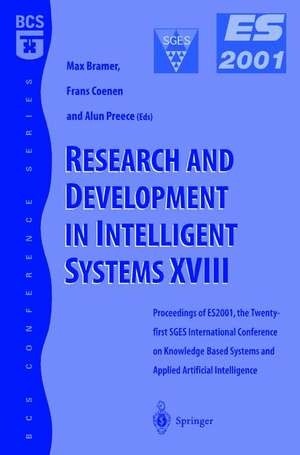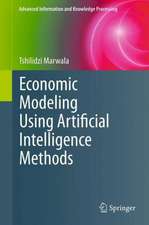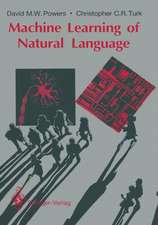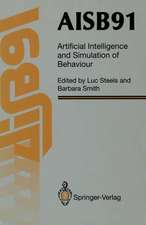Research and Development in Intelligent Systems XVIII: Proceedings of ES2001, the Twenty-first SGES International Conference on Knowledge Based Systems and Applied Artifical Intelligence, Cambridge, December 2001
Editat de Frans Coenen, Alun Preeceen Limba Engleză Paperback – 27 noi 2001
Preț: 988.98 lei
Preț vechi: 1236.23 lei
-20% Nou
Puncte Express: 1483
Preț estimativ în valută:
189.25€ • 202.36$ • 157.79£
189.25€ • 202.36$ • 157.79£
Carte tipărită la comandă
Livrare economică 18 aprilie-02 mai
Preluare comenzi: 021 569.72.76
Specificații
ISBN-13: 9781852335359
ISBN-10: 1852335351
Pagini: 336
Ilustrații: X, 325 p. 30 illus.
Dimensiuni: 155 x 235 x 18 mm
Greutate: 0.47 kg
Ediția:2002
Editura: SPRINGER LONDON
Colecția Springer
Locul publicării:London, United Kingdom
ISBN-10: 1852335351
Pagini: 336
Ilustrații: X, 325 p. 30 illus.
Dimensiuni: 155 x 235 x 18 mm
Greutate: 0.47 kg
Ediția:2002
Editura: SPRINGER LONDON
Colecția Springer
Locul publicării:London, United Kingdom
Public țintă
ResearchDescriere
M.A. BRAMER University of Portsmouth, UK This volume comprises the refereed technical papers presented at ES200 l, the Twenty-fIrst SGES International Conference on Knowledge Based Systems and Applied ArtifIcial Intelligence, held in Cambridge in December 200 l, together with an invited keynote paper by Professor Derek Sleeman. The conference was organised by SGES, the British Computer Society Specialist Group on Knowledge Based Systems and Applied ArtifIcial Intelligence. The papers in this volume present new and innovative developments in the fIeld, divided into sections on Machine Learning, Constraint Satisfaction, Agents, Knowledge Representation, Knowledge Engineering, and Intelligent Systems. The refereed papers begin with a paper entitled 'Detecting Mismatches Among Experts' Ontologies Acquired Through Knowledge Elicitation', which describes a systematic approach to the analysis of discrepancies within and among experts' ontologies. This paper was judged to be the best refereed technical paper submitted to the conference. The remaining papers are devoted to topics in important areas such as agents, knowledge engineering, knowledge representation, planning and constraint satisfaction, with machine learning again the largest topic covered in terms of the number of papers accepted for publication. This is the eighteenth volume in the Research and Development series. The Application Stream papers are published as a companion volume under the title Applications and Innovations in Intelligent Systems IX.
Cuprins
Technical Programme Chairman's Introduction.- Technical Keynote Address: Knowledge Technologies: a ReUse Perspective.- Best Technical Paper: Detecting Mismatches Among Experts'Ontologies Acquired Through Knowledge Elicitation.- Session 1. Machine Learning 1: Using J-Pruning to Reduce Overfitting in Classification Trees. Explanation of Attribute Relevance in Decision-Tree Induction. Optimising Association Rule Algorithms Using Itemset Ordering. ADANNET: Automatic Design of Artificial Neural Networks by Evolutionary Techniques.- Session 2. Machine Learning 2/Constraint Satisfaction: Informed Selection of Filter Examples for Knowledge Refinement. Competence-Guided Case Discovery. The Inseparability Problem in Interactive Case-Based Reasoning. Preprocessing Algorithms for Non-binary Disjunctive Constraint Satisfaction.- Session 3. Agents: A Study of Autonomous Agent Navigation Algorithms in the ANIMAT Environment. Intelligent Agents for Resource Management in Third Generation Mobile Networks. DARBS: A Distributed Blackboard System. A Database Architecture for Reusable CommonKADS Agent Specification Components.- Session 4. Knowledge Representation: UML as an Approach to Modelling Knowledge in Rule-based Systems. Modelling Knowledge and Reasoning using Locally Active Elements in Semantic Networks. Using Meta-Level Knowledge to Improve Solutions in Coordination Problems. A Case Study in Ontologies for Probabilistic Networks.- Session 5. Knowledge Engineering: WebShell: the Development of Web-based Expert Systems. Logical Approach in Knowledge-Based Control. An Advanced Stemming Algorithm for Creating Concept Signatures of Medical Terms. Developing an Information System for Framework Reuse.- Session 6: Let's See What Happens if We Integrate AI Planning with Workflow Management System. A Non-binary Constraint Satisfaction Solver: The One-face Hyperpolyhedron Heuristic.























